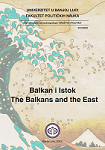SOCIAL DISTANCE TOWARDS MIGRANTS IN BOSNIA AND HERZEGOVINA AND THE ROLE OF SOCIAL WORK IN THEIR INTEGRATION
SOCIAL DISTANCE TOWARDS MIGRANTS IN BOSNIA AND HERZEGOVINA AND THE ROLE OF SOCIAL WORK IN THEIR INTEGRATION
Author(s): Jagoda P. Petrović, Selma PorobićSubject(s): Sociology, Social differentiation, Welfare services, Migration Studies, Asylum, Refugees, Migration as Policy-fields
Published by: Fakultet političkih nauka Univerziteta u Banjoj Luci
Keywords: migrants; social distance; cultural conflicts theory; mediation; culturally sensitive social work;
Summary/Abstract: The paper discusses the domicile populations’ attitudes towards migrant population and the mediating role of social work in Bosnia and Herzegovina – a prevailing migrant hotspot on the Balkan route. This empirical study relies on the theory of cultural conflicts and uses the Bogardus Social Distance Scale. It draws from the first-hand data, involving 300 respondents from the local population, who were surveyed in the cities with the highest density of migrants. The results yield an explicitly high social distance score, not influenced by the ethnic affiliation of the domicile population. The study suggests that social workers should take a proactive role in mitigating risks of the idenitified ruptures between the locals and the migrants. It notes the importance of applying all three theoretical and methodological approaches to social work: work with individuals, to support the adaptation to the administrative and socio-cultural requirements of the receiving society; work with the migrant groups, to enable migrant families and other social groups to maintain or (re)establish high-social cohesion and influence on their own group members; work in the community, which would most effectively connect the local and the new migrant population around commonly identified social needs and issues.
Journal: Društvo i politika
- Issue Year: 3/2022
- Issue No: 3
- Page Range: 43-58
- Page Count: 16
- Language: English

